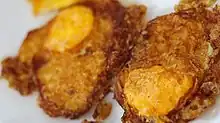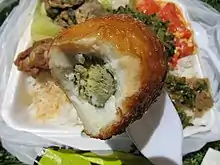

A deep fried egg is an egg dish consisting of an egg that has been deep fried. Sometimes the dish is prepared only using the egg yolk, which is referred to as deep fried egg yolk.[1] Various types of eggs can be used, such as chicken, duck and quail eggs. The dish is sometimes served alone, and is also used as an ingredient for various dishes. Sometimes also pre-cooked eggs are breaded and deep fried.
Overview
A typical deep fried egg preparation is to crack the eggs directly into a container of heated cooking oil and then continuously spooning the egg white around the yolk to keep the yolk covered.[2][3] Another method involves using two cooking spoons to continuously roll the egg in the oil after the egg white spooning process, which can assist in creating a consistent shape and coloration.[4] As the egg cooks, the egg white transforms into a crunchy, hardened crust that surrounds the egg yolk.[2] It is sometimes seasoned, such as with salt and pepper.[3]

Deep fried egg yolk is sometimes prepared using breading on the yolk, which is then deep fried.[1] When breaded, the surface of the dish is crunchy, and the interior can be molten, soft and creamy.[1] This is sometimes served as an appetizer.[1]
Using pre-cooked eggs, such as poached or boiled eggs,[5][6][7] they also sometimes are coated in breading before the deep frying.[8]
All variants can be either served as a meal in its own right or used as an ingredient or side dish, e.g. as topping on a salad.[9]
Deep fried egg dishes
Deep fried eggs are an ingredient in the Indonesian dish balado tahu telor, which consists of deep fried eggs, deep fried tofu and chili peppers.[6]

The deep fried egg is a popular dish in Asia.[10] Tokneneng is a tempura-like Filipino street food made by deep-frying annatto-dyed orange batter covered hard-boiled chicken or duck eggs.[11][12] Kwek-kwek is a Filipino street food consisting of orange-battered and deep fried quail eggs.[12]
Deep fried balut consists of a fertilized developing egg embryo that is boiled with the shell on and then deep fried.[13][14] It is sometimes served on a stick in the Philippines.[13]
Son-in-law eggs (Thai: kai look keuy) is a Thai dish prepared using deep fried hard boiled eggs and a sweet and sour caramel sauce.[15][16] It is a relatively common street food in Thailand.[16] In Thai folklore, some sources state[lower-alpha 1] that the dish is served as a warning to a mother's son-in-law who is mistreating his wife, or as a warning to a future son-in-law to not mistreat his wife, in which the dish is served to the son-in-law, with the eggs symbolically representing fried testicles.[15][lower-alpha 2]
Prepared deviled eggs can be deep fried and served as a hot dish, too.[18]
Hazards
Preparation of this dish can be "rather dangerous",[7] because when raw cracked eggs are dropped into hot oil, the oil can significantly erupt and splatter onto the cook or onto a hot stove burner,[4] causing serious burns and potentially a fire as well.[7] Preparing the dish using pre-cooked poached eggs that are well-drained of water can be a safer means of preparation.[7]
See also
- List of deep fried foods
- List of egg dishes
- Fried egg – Cooked dish made from one or more eggs
- Scotch egg – Boiled egg wrapped in sausage meat
Notes
References
- 1 2 3 4 Fetterman, L.Q.; Halm, M.; Lo, M.; Peabody, S. (2016). Sous Vide at Home: The Modern Technique for Perfectly Cooked Meals. Ten Speed Press. p. 29. ISBN 978-0-399-57806-9. Retrieved June 25, 2022.
- 1 2 Peterson, J. (2012). Glorious French Food: A Fresh Approach to the Classics. Houghton Mifflin Harcourt. pp. 146–147. ISBN 978-0-544-18655-2. Retrieved June 25, 2022.
- 1 2 Breakfast: the Most Important Book about the Best Meal of the Day. Time Incorporated Books. 2018. pp. 32–33. ISBN 978-0-8487-5928-5. Retrieved June 25, 2022.
- 1 2 Morel, M.M.; Bpi, E. The French Chef Handbook. Editions BPI. pp. 286–287. ISBN 978-2-85708-851-6. Retrieved June 25, 2022.
- ↑ Shen, B. (2014). Artichoke: Recipes & Stories from Singapore's Most Rebellious Kitchen. Epigram Books. p. 252. ISBN 978-981-4615-01-3. Retrieved June 25, 2022.
- 1 2 Wright, C. (2005). Some Like It Hot: Spicy Favorites From The World's Hot Zones. Harvard Common Press. p. 116. ISBN 978-1-55832-269-1. Retrieved June 25, 2022.
- 1 2 3 4 Dark, G.; McLean, D.; Weatherhead, S. (2015). Kitchen Operations. Pearson Australia. p. 359. ISBN 978-1-4425-4171-9. Retrieved June 25, 2022.
- ↑ Slonecker, A.; Reamer, D.L. (2014). Eggs on Top: Recipes Elevated by an Egg. Chronicle Books LLC. p. 67. ISBN 978-1-4521-3040-8. Retrieved June 25, 2022.
- ↑ Eastwood, H. (2013). A Salad for All Seasons: Delicious, uplifting and easy recipes for the whole year. Transworld. pp. 101–102. ISBN 978-1-4481-2591-3. Retrieved June 25, 2022.
- ↑ Waitrose Food Illustrated. John Brown Contract Publishing. 2006. p. 92. Retrieved June 29, 2022.
- ↑ Polistico, E. (2017). Philippine Food, Cooking, & Dining Dictionary. Anvil Publishing, Incorporated. p. 407. ISBN 978-621-420-087-0. Retrieved June 25, 2022.
- 1 2 Kraig, B. (2013). Street Food around the World: An Encyclopedia of Food and Culture: An Encyclopedia of Food and Culture. ABC-CLIO. p. 275. ISBN 978-1-59884-955-4. Retrieved June 25, 2022.
- 1 2 Magat, M. (2019). Balut: Fertilized Eggs and the Making of Culinary Capital in the Filipino Diaspora. Bloomsbury Publishing. pp. 25–26. ISBN 978-1-4742-8034-1. Retrieved June 26, 2022.
- ↑ Galván, J.A. (2014). They Do What? A Cultural Encyclopedia of Extraordinary and Exotic Customs from around the World: A Cultural Encyclopedia of Extraordinary and Exotic Customs from around the World. ABC-CLIO. p. 21. ISBN 978-1-61069-342-4. Retrieved June 26, 2022.
- 1 2 "In Thai Lore, These Fried Hard-Boiled Eggs Were a Veiled Threat for a Son-in-Law". Atlas Obscura. June 29, 2022. Retrieved June 29, 2022.
- 1 2 3 Digges, Mariam (May 29, 2017). "Son-in-law eggs: The gruesome story behind this street food delicacy". SBS. Retrieved June 29, 2022.
- ↑ Punyaratabandhu, L. (2014). Simple Thai Food: Classic Recipes from the Thai Home Kitchen. Donación Ministerio de Relaciones Exteriores de Tailandia. Ten Speed Press. p. 47. ISBN 978-1-60774-523-5. Retrieved June 29, 2022.
- ↑ Villas, J.; Wyche, J. (2013). Southern Fried: More Than 150 Recipes for Crab Cakes, Fried Chicken, Hush Puppies, and More. Houghton Mifflin Harcourt. p. 59. ISBN 978-1-118-13076-6. Retrieved June 26, 2022.
Further reading
- Pépin, J.; Pépin, C. (2001). Jacques Pépin Celebrates. Alfred A. Knopf. p. 53. ISBN 978-0-375-41209-7. Retrieved June 29, 2022.
External links
 Media related to Deep fried egg at Wikimedia Commons
Media related to Deep fried egg at Wikimedia Commons- "Deep-Fried Eggs with Sriracha Remoulade". Bon Appétit. November 18, 2009.